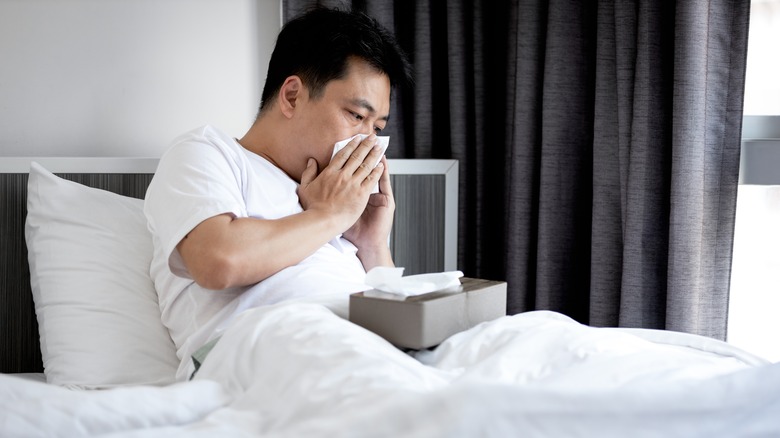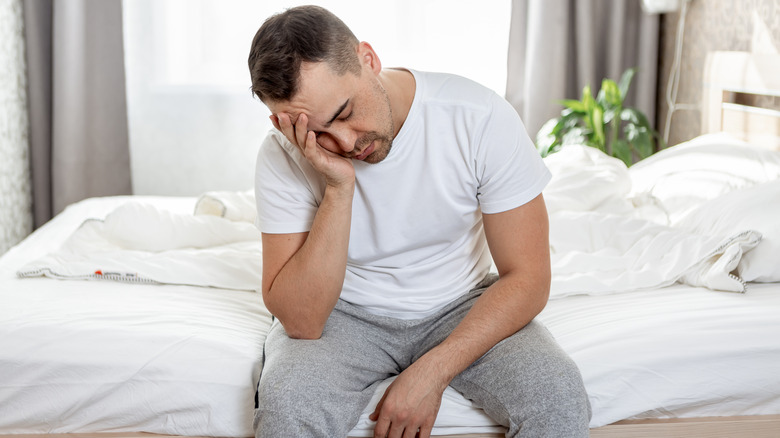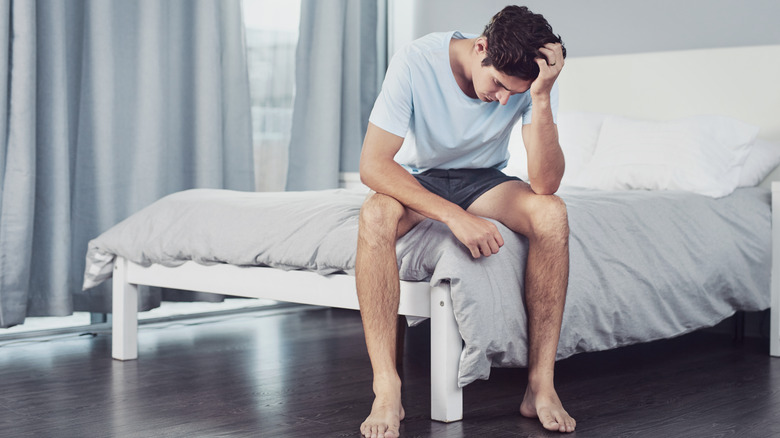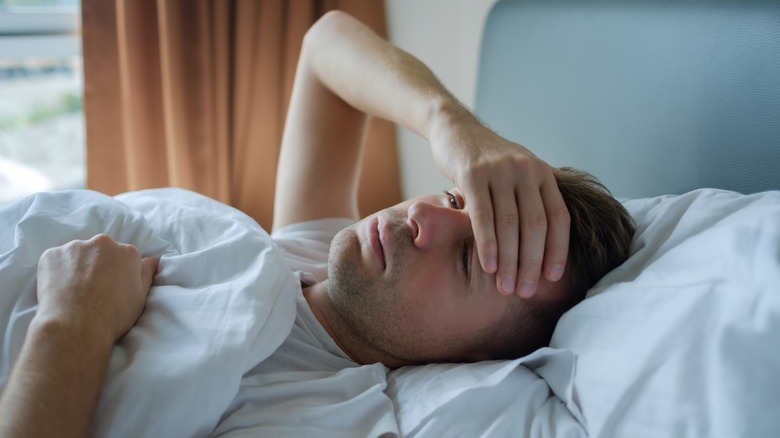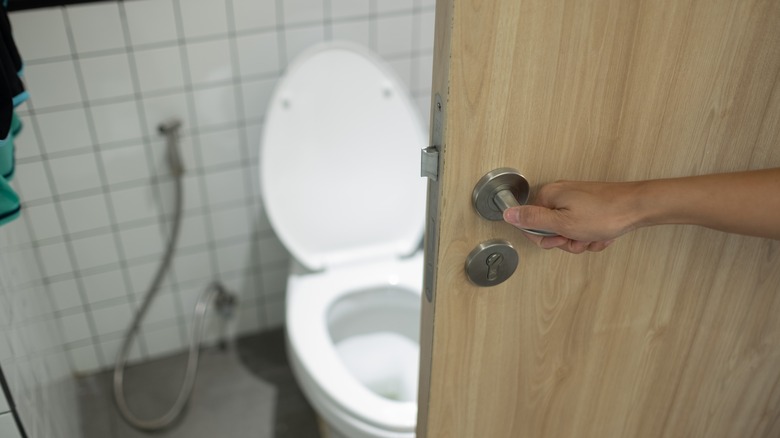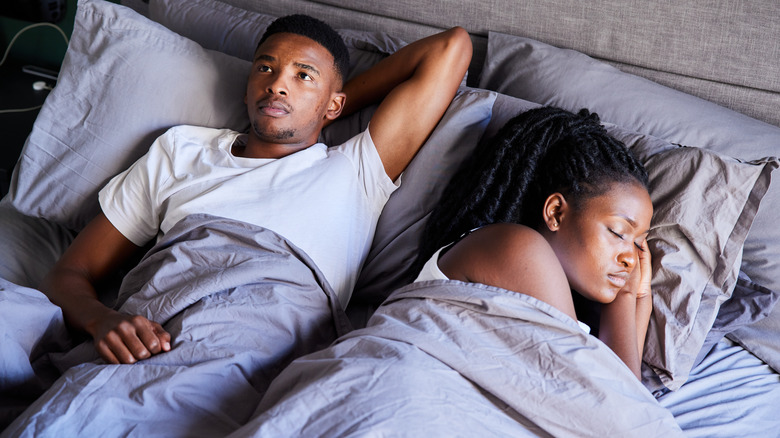Weird Things That Can Happen To Men During Sex
There are a number of stereotypes surrounding men and sex, ranging from the rumor that they think about sex once every seven seconds to the idea that all they're looking for is a physical connection. However, there is ample evidence to prove that men's relationship to sex runs far deeper than most people would think. A 2011 study conducted by Ohio State University revealed that men actually think about sex an average of 19 times daily, which is far less frequent than the aforementioned rumor suggests. Additionally, a 2017 study published in the Journal of Sex Research showed that one of the things that hampers men's sexual desire the most is a lack of an emotional connection.
With this information in mind, it's clear that there are a lot of suppositions about men and sex that may be off the mark. From erectile problems to crying during and after sex, there are a number of issues that men face in the bedroom that either aren't talked about or aren't as well known. Here are just a few of the things that, should they happen to your male partner, shouldn't catch you off guard.
Stuffiness
As bizarre as it may sound, sex can, in some cases, actually stuff up your nose. A condition known as honeymoon rhinitis is an allergic reaction that occurs during sexual arousal. People with this condition can experience everything from a runny nose to congestion, sneezing, and nasal irritation as a result of sexual activity.
Honeymoon rhinitis can be triggered by a number of different factors. These can include increased blood flow due to sexual arousal (which may also happen in the nasal passages) or the release of histamine caused by physical and emotional excitement. Additionally, a 2002 study published in the Journal of the Royal Society of Medicine noted that erectile tissue is present in the turbinates of the nose, which can become engorged during sexual activity and cause rhinitis. Treatment methods can include over-the-counter nasal decongestants or antihistamines. Extreme or debilitating cases may require the intervention of a doctor who can prescribe allergen immunotherapy.
Headaches
As the oft-repeated cliche goes, a headache is often given as the reason that one partner or the other is not interested in sex. However, the onset of a sudden headache after orgasm, or even during sex itself, is something that can occur. The pain can be intense or throbbing, and can even move from one side of the head to the other. The length of the pain can vary from person to person. In some cases, it can subside fairly quickly, while other people may experience dull, lingering pain that can last a few days.
According to a 2010 study published in the British Journal of Medical Practitioners, approximately one percent of people worldwide experience headaches that are connected to sexual activity, and the condition is three to four times more common in men than women. In general, they aren't cause for concern; with that said, it is recommended that you contact your doctor immediately if you do experience a headache during or after sexual activity in order to rule out anything serious.
Painful ejaculation
A painful orgasm is the last thing anyone wants to experience during sex. However, according to Medical News Today, up to 10% of men can have pain during ejaculation. For men who suffer from a condition known as prostatitis, that number can go up to between 30% and 75%. For those who do experience it, painful orgasm can be felt at the time of ejaculation, shortly before or after it happens, or even during urination immediately following an ejaculation. In some cases, this pain can last as long as 24 hours after sex.
Per experts, this condition can have a number of causes, including prostatitis, cysts or stones in the ejaculatory duct, or as an effect of having surgery, such as a prostatectomy to treat prostate cancer. If you do experience pain during ejaculation, it's important to see a doctor right away, as it could be a sign of something more serious, including cancer.
Crying
After connecting with your partner physically and emotionally, not to mention just having had sex, it seems hard to imagine that you would be feeling anything but joyful. However, many men (and women as well) can go through something called postcoital tristesse (PCT). It can also be known as postcoital dysphoria, and can be marked by feelings of anxiety, depression, panic attacks, and, yes, crying. A 2018 study published in the Journal of Sex and Marital Therapy revealed that 41% of the men profiled had experienced PCT at one time or another.
There can be a number of causes for PCT, including clinical depression, repressed trauma, or emotional issues that surface as a result of the intense emotions brought about by sexual activity. There could also be physical causes, such as bladder problems, that could lead to PCT. Working with a doctor or therapist can help you get to the root of the problem and seek the proper treatment.
Feeling sick
As surprising as it may seem, a 2020 study in Urology Case Reports notes that some men can experience such symptoms as congestion, fatigue, flu-like symptoms, and difficulty concentrating after ejaculation. This rare condition is known as post-orgasmic illness syndrome (POIS), and was first discovered in 2002. Symptoms can last for anywhere from two to seven days. The cause has been hard to pin down, with some experts pointing to a possible autoimmune disorder or an inflammatory reaction based on a semen allergy.
There is still not a lot known about POIS, as the Journal of Rare Diseases and Treatment notes that only about 50 cases have been written about in medical literature since the condition's discovery. As a result, there isn't one definitive treatment method in place. Treatments have varied from benzodiazepenes to prednisone to selective serotonin reuptake inhibitors. If you begin to notice symptoms of POIS, check with your doctor for a proper diagnosis and treatment options.
Penis pain
Women can experience vaginal pain during sex, but it's not as commonly reported that men can also suffer from penile pain. There can be a number of causes for painful sex for men.
In some instances, it could be as simple as a lack of proper lubrication, which can usually be solved by over-the-counter treatments. If you and your partner often have sex vigorously or for extended periods of time, the repetitive movements and intense activity can also put a strain on the penis, leading to soreness and discomfort.
In serious cases, some men can develop a condition known as Peyronie disease, in which scar tissue can build up in the penis and cause curvature of the penis and painful erections. If the curve becomes too severe, it can make having sex painful or even impossible. It can also change the way the penis looks or lead to erectile dysfunction. Early detection is the key if you feel like you may be experiencing Peyronie disease. The faster you can get it checked and begin treatment, the less risk you're running of developing a more serious condition.
Difficulty urinating afterwards
The urge to urinate after sex is not uncommon, both for men and women. However, some people find post-sex urination to be a somewhat difficult task. The difficulty can cause discomfort and even pain. There are a number of potential causes, ranging from medication side effects to a urinary tract infection to problems with the prostate.
You could also experience painful urination after sex. This could be caused by a condition known as urethritis, or an inflammation of the urethra. Urethritis occurs when the tube that carries urine out of the penis becomes inflamed due to a bacterial infection. This is usually attributed to a sexually transmitted disease such as gonorrhea or chlamydia. The herpes simplex virus can also be a cause, and the condition is often treated via antibiotics. Difficulty urinating or painful urination could be little more than a passing problem, or it could be a sign of something more serious happening. It's important to get it checked out as quickly as you can by your doctor.
Erectile dysfunction
Erectile dysfunction, the inability to achieve or maintain an erection, is not something men want to talk about or even think about. However, a 2018 study published in Sexual Medicine estimated that a third of men are affected by the condition. And the older men get, the more likely they are to develop erectile dysfunction. The Cleveland Clinic reveals that more than 50% of men between ages 40 and 70 can suffer from it, and that number could actually be higher, given the fact that most men don't talk about it due to embarrassment.
There are a number of factors that can make getting an erection difficult for men. These include prostate problems, high blood pressure, diabetes, and drug and alcohol use. There can also be psychological causes at work, such as depression, difficulty with intimacy and relationships, and an overall lack of sexual knowledge.
Fortunately, there are different treatments available for erectile dysfunction. These include oral medications (such as Viagara or Cialis), penis pumps, or penile implants. Exercise and counseling can also help with the condition. Talk with your doctor to determine the best course of action for your erectile problems.
Premature ejaculation
Premature ejaculation occurs when a man experiences an orgasm before either he or his partner is ready. The Cleveland Clinic reports that it can often happen immediately after penetration and can be a source of embarrassment for men and a source of frustration for their partners. Up to 40% of men will experience premature ejaculation at some point in their lives. It can be triggered by a few factors, including stress, anxiety, and fear about sexual performance. Physiological causes can also come into play, such as hormonal issues, low levels of serotonin, or even an extra-sensitive penis.
Premature ejaculation isn't cause for concern if it rarely happens or is an isolated incident. However, if it is a regular occurrence, happening within just a few minutes of penetration, then you may want to seek treatment. Experts recommend various options for treating this condition, such as therapy and counseling, numbing creams or sprays, or physical methods that you and your partner can practice to help delay ejaculation. These include the squeeze method, in which your partner squeezes your penis when you feel close to climax, making you more aware of the sensations and learning to delay your orgasm. There is also the stop-start method, in which you stop penile stimulation as you feel your orgasm approaching, then start again, stopping and starting three times before climaxing for the fourth time. Whatever methods you attempt, you should always do so with mutual consent and understanding between you and your partner and the approval and recommendation of your doctor.

